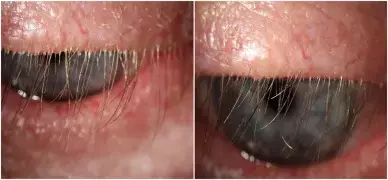- Home
- Medical news & Guidelines
- Anesthesiology
- Cardiology and CTVS
- Critical Care
- Dentistry
- Dermatology
- Diabetes and Endocrinology
- ENT
- Gastroenterology
- Medicine
- Nephrology
- Neurology
- Obstretics-Gynaecology
- Oncology
- Ophthalmology
- Orthopaedics
- Pediatrics-Neonatology
- Psychiatry
- Pulmonology
- Radiology
- Surgery
- Urology
- Laboratory Medicine
- Diet
- Nursing
- Paramedical
- Physiotherapy
- Health news
- Fact Check
- Bone Health Fact Check
- Brain Health Fact Check
- Cancer Related Fact Check
- Child Care Fact Check
- Dental and oral health fact check
- Diabetes and metabolic health fact check
- Diet and Nutrition Fact Check
- Eye and ENT Care Fact Check
- Fitness fact check
- Gut health fact check
- Heart health fact check
- Kidney health fact check
- Medical education fact check
- Men's health fact check
- Respiratory fact check
- Skin and hair care fact check
- Vaccine and Immunization fact check
- Women's health fact check
- AYUSH
- State News
- Andaman and Nicobar Islands
- Andhra Pradesh
- Arunachal Pradesh
- Assam
- Bihar
- Chandigarh
- Chattisgarh
- Dadra and Nagar Haveli
- Daman and Diu
- Delhi
- Goa
- Gujarat
- Haryana
- Himachal Pradesh
- Jammu & Kashmir
- Jharkhand
- Karnataka
- Kerala
- Ladakh
- Lakshadweep
- Madhya Pradesh
- Maharashtra
- Manipur
- Meghalaya
- Mizoram
- Nagaland
- Odisha
- Puducherry
- Punjab
- Rajasthan
- Sikkim
- Tamil Nadu
- Telangana
- Tripura
- Uttar Pradesh
- Uttrakhand
- West Bengal
- Medical Education
- Industry
Local application of Ivermectin ointment safe and effective therapy for patients with Demodex blepharitis: Study

Local application of Ivermectin ointment safe and effective therapy for patients with Demodex blepharitis suggests a study published in Graefe's Archive for Clinical and Experimental Ophthalmology.
A study was done to evaluate the efficacy of topical ivermectin 1% ointment, for the treatment of Demodex blepharitis. A retrospective study was designed to review electronic medical records of patients seen between January 2017 and December 2022, who had a diagnosis of Demodex blepharitis, treated with topical ivermectin 1% with at least 6 months of follow-up (Centro de Ojos Quilmes, Buenos Aires, Argentina). The presence of collarettes was graded from 0 to 4. An imaging system (Keratograph) was used, to evaluate tear meniscus height (TMH), non-invasive tear break-up time (NIKBUT), and degree of conjunctival redness. In addition, the ocular surface disease index (OSDI) test was performed. Results were compared before and after ivermectin treatment, which was performed once a day for 2 months. Results: A total of 2157 patients (4314 eyes) were included.
The mean age was 50.43 ± 15.3 years, and the follow-up time was 26.1 ± 8.5 months. No one discontinued treatment due to intolerance, although 14 cases (0.6 %) reported occasional discomfort. The grade of collarettes decreased with statistical significance, from 3.37 ± 0.7 to 0.1 ± 0.3 (p < 0.01), as well as conjunctival redness from 1.32 ± 0.3 to 0.94 ± 0.4 (p < 0.01) and OSDI score from 58.74 ± 17.9 to 17.1 ± 10.5 (p = 0.02). TMH and NIKBUT improved without statistical difference. Treatment with ivermectin 1% topical ointment, once daily for 2 months, was effective in reducing the presence of collarettes and in improving symptoms in patients with Demodex blepharitis.
Reference:
Valvecchia, F., Greco, L., Perrone, F. et al. Topical ivermectin ointment treatment of Demodex blepharitis: a 6-year retrospective study. Graefes Arch Clin Exp Ophthalmol 262, 1281–1288 (2024). https://doi.org/10.1007/s00417-023-06281-0
Dr. Shravani Dali has completed her BDS from Pravara institute of medical sciences, loni. Following which she extensively worked in the healthcare sector for 2+ years. She has been actively involved in writing blogs in field of health and wellness. Currently she is pursuing her Masters of public health-health administration from Tata institute of social sciences. She can be contacted at editorial@medicaldialogues.in.
Dr Kamal Kant Kohli-MBBS, DTCD- a chest specialist with more than 30 years of practice and a flair for writing clinical articles, Dr Kamal Kant Kohli joined Medical Dialogues as a Chief Editor of Medical News. Besides writing articles, as an editor, he proofreads and verifies all the medical content published on Medical Dialogues including those coming from journals, studies,medical conferences,guidelines etc. Email: drkohli@medicaldialogues.in. Contact no. 011-43720751


